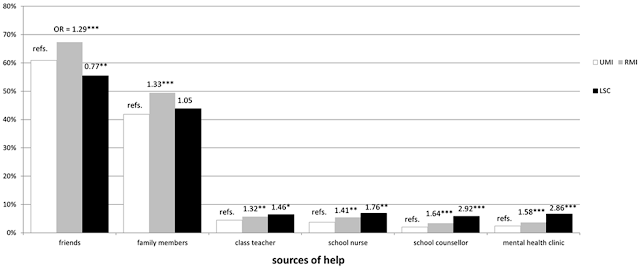Objective
The
recognition of mental illness without anticipating stigma might encourage
adolescents’ help-seeking behavior. We aimed to identify the relationship
between mental illness identification and adolescents’ intention to seek help
if faced with mental illness.
Method
We
examined the relationships between help-seeking intentions and recognition of
mental illness (RMI) without correctly identifying the disease name, as well as
correct labelling of schizophrenia (LSC) using a vignette about a person with schizophrenia
in a cross-sectional survey of 9,484 Japanese high-school students aged 15–18
years.
Results
When
compared with adolescents who were unable to recognize the mental illness (UMI)
in the vignette, those in the RMI group reported they were significantly more
likely to seek help from friends (odds ratio [OR] = 1.29; 95% confidence
interval [CI] = 1.17–1.41; P < 0.001) and expressed an increased
likelihood to seek help from professionals (all P < .05). Those in the LSC group reported
they were significantly less likely to exhibit help-seeking behavior (OR =
0.77, 95% CI = 0.65–0.92, P = 0.003) and expressed an increased
likelihood of help-seeking from health professionals than the UMI group (all P < .05).
Conclusion
The ability to recognize mental illness without
identifying the disease may increase help-seeking from friends, while the
ability to identify the disease as schizophrenia might decrease late
adolescents’ help-seeking. To promote help-seeking behavior among adolescents,
improving their ability to recognize mental illness generally is recommended.
Below: Percentages of subjects in each group seeking help from different sources according to their responses to the case vignette of schizophrenia
Below: Percentages of subjects in each group seeking help from different sources according to their responses to the case vignette of schizophrenia
Full article at: http://goo.gl/Auastz
By:
Syudo Yamasaki, Shuntaro
Ando, Kaori Endo, Nozomu Asukai, Atsushi Nishida
Department of Psychiatry and Behavioral Science, Tokyo Metropolitan Institute of Medical Science, Tokyo, Japan
Department of Psychiatry and Behavioral Science, Tokyo Metropolitan Institute of Medical Science, Tokyo, Japan
Shuntaro Ando, Kaori Endo
Department of Neuropsychiatry, Graduate School of Medicine, The University of Tokyo, Tokyo, Japan
Department of Neuropsychiatry, Graduate School of Medicine, The University of Tokyo, Tokyo, Japan
Shinji Shimodera
Department of Neuropsychiatry, Kochi Medical School, Kochi University, Kochi, Japan
Department of Neuropsychiatry, Kochi Medical School, Kochi University, Kochi, Japan
Yuji Okazaki
Kouseikai Michinoo Hospital, Nagasaki, Japan
Kouseikai Michinoo Hospital, Nagasaki, Japan
Yuji Okazaki
Tokyo Metropolitan Matsuzawa Hospital, Tokyo, Japan
Tokyo Metropolitan Matsuzawa Hospital, Tokyo, Japan
Nozomu Asukai
Aoyamakai Aoki Hospital, Tokyo, Japan
Aoyamakai Aoki Hospital, Tokyo, Japan
Satoshi Usami
Department of Psychology, University of Tsukuba, Ibaraki, Japan
Department of Psychology, University of Tsukuba, Ibaraki, Japan
Tsukasa Sasaki
Department of Physical and Health Education, Graduate School of Education, The University of Tokyo, Tokyo, Japan
Department of Physical and Health Education, Graduate School of Education, The University of Tokyo, Tokyo, Japan





